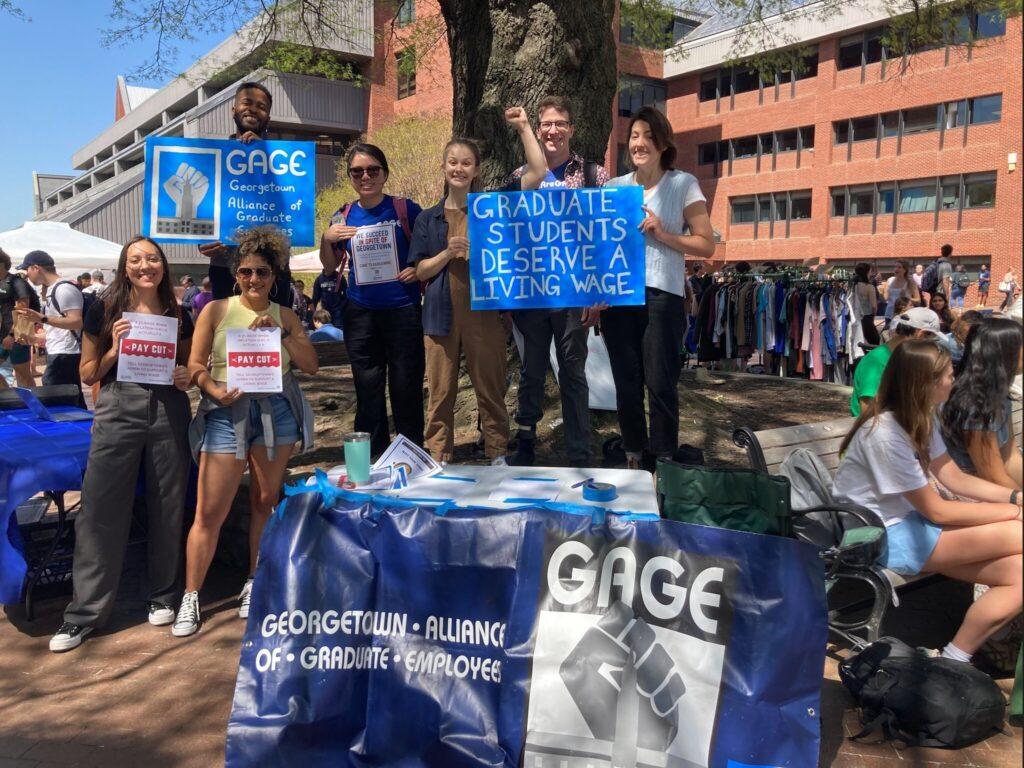Georgetown University graduate student workers and university administrators continued to meet this week after months-long negotiations over demands of the Georgetown Alliance of Graduate Employees (GAGE) for a livable wage.
Since October, students in GAGE, the labor union for graduate student workers, have been in negotiations with university administrators to agree on wages for graduate student workers. GAGE members have called for a roughly $12,000 increase in wage stipends, including an increase from $33,813 to $45,802 for nine-month Ph.D. stipends and $36,934 to $49,466 for 12-month Ph.D. stipends.
GAGE has sought to engage the student body and graduate workers with tabling events, as well as an April 21 rally in Red Square calling for higher wages.
Representatives for GAGE said that despite ongoing inflation and tuition increases of around 5% in recent years, the university offered a 4% increase to the wages of graduate student workers, which fell roughly $10,000 short of GAGE’s demand per worker. Prior to this, the university originally offered a 2.5% increase but after negotiations, offered an additional 0.5% increase. As negotiations progressed, GAGE negotiators told The Hoya that university negotiators raised that number by another 1%.
Dominick Cooper, a rising fourth-year doctoral student and the president of GAGE, said he believes the university’s proposals are inadequate in their current iterations.
“In our current inflationary environment, these proposals are, functionally speaking, proposals for grad student workers to take pay cuts,” Cooper wrote to The Hoya. “This is not a contract that will come close to meeting the needs of GAGE members, and it is not a contract that GAGE members deserve.”
On April 17, GAGE negotiators said a university offer included an hourly rate of $21.10 for hourly workers as well as $35,167 for nine-month doctoral candidates and $38,411 for 12-month doctoral candidates. A single adult in Washington, D.C., must earn $46,082 before taxes to meet the threshold for a livable wage, according to the Massachusetts Institute of Technology’s (MIT) Living Wage Calculator.
The calculator uses economic measurements that account for geographic differences, as well as a wider range of basic expenses, including health care, which GAGE members receive through their university contracts.

GAGE workers have especially expressed frustration over the university’s decision to spend $11 million to buy out former men’s basketball Head Coach Patrick Ewing (CAS ’85), while offering to spend fewer than $200 per student on stipend increases for graduate student workers, according to a GAGE tweet.
“We value our graduate students and their contributions to the Georgetown community and are committed to ensuring they are supported during their academic formation at Georgetown,” a university spokesperson wrote to The Hoya.
GAGE representatives said that among Georgetown University’s 10 self-selected peer institutions, none of which are in the region and five of which are members of the Ivy League, Georgetown ranks last in graduate student wages based on the MIT wage calculator.
Doctoral candidates at Georgetown receive full tuition, dental insurance and health coverage, as well as the highest stipend in the D.C. area for part-time work over nine or 12 months, depending on their program, according to a university spokesperson.
“Converting 9-month and 12-month stipends from 15 hours to 40 hours would produce full-time equivalents of at least $90,000 and $98,000, respectively,” a university spokesperson wrote.
Sidhant Saraogi, a rising third-year doctoral student and GAGE’s lead organizer for natural and biomedical sciences, said graduate student working hours often exceed their 15-hour-a-week contractual obligations.
“It is no secret that our members work much more than what is expected from us in our contract,” Saraogi wrote to The Hoya.
Beyond acting as teaching and research assistants, graduate students are encouraged to conduct research and attend conferences, but often, they need to take other paid jobs, according to a tweet by a GAGE member.
This is not the first time GAGE and university administrators have been locked in negotiations. In 2020, they negotiated over health and economic protections that resulted in arbitration proceedings.
So far, Cooper said GAGE has made progress in its negotiations with the university in terms of noneconomic terms, and each side said they hope to continue working toward an agreement.
“Our negotiations with the GU administration began in October of last year, and we’ve made some good progress so far on many non-economic aspects of our contract, particularly on elements of the contract focused on immigration processing for international students, protection for undocumented workers, and stronger language on union security,” Cooper wrote.





















